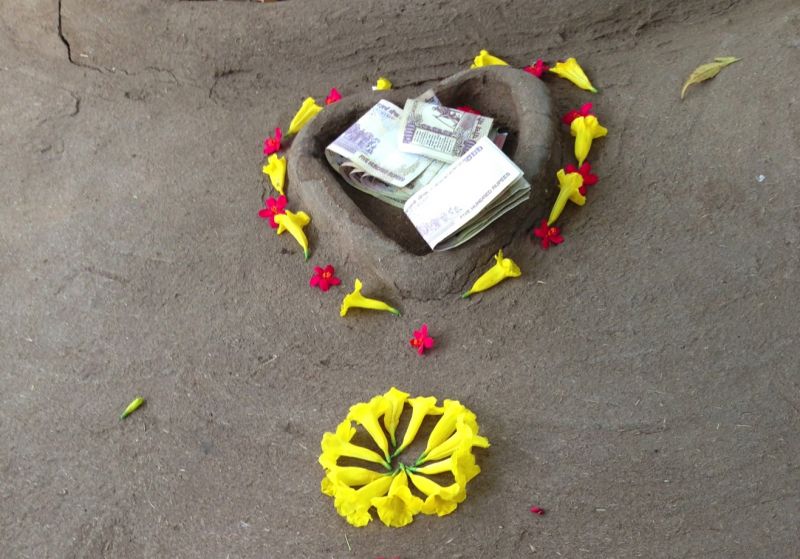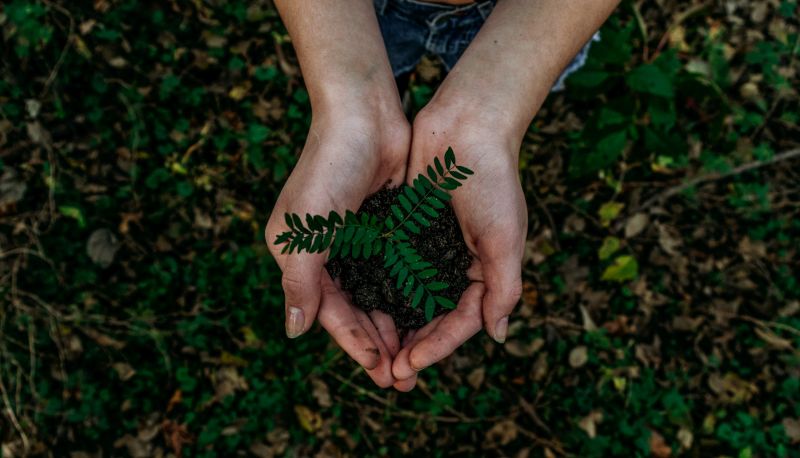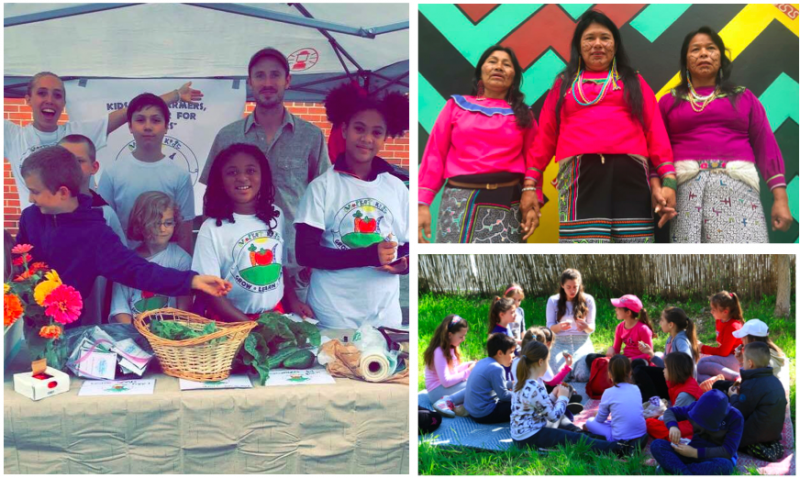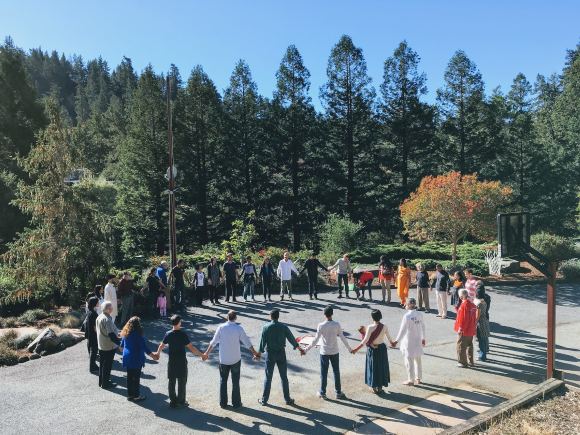Experimenting With Money In A Gift Ecology
How would a ServiceSpace volunteer approach philanthropy? I’ve been pondering this question ever since attending a Gandhi 3.0 retreat in early 2017.
Prior to ServiceSpace, I operated in a culture that saw finances as *the* essential form of capital required to initiate societal changes. At the time, I felt that if only the right people in the right places had sufficient money, the world would be a better place. Over the years of immersing myself into a gift-ecology, however, has enhanced my presence to various forms of wealth that I often overlooked and underappreciated. Alternate forms of capital -- like spirit-wealth of gratitude, equanimity and surrender; or service-wealth of acts of kindness and giftivism; or community-wealth, such as relationships and compassion -- have an architecture of abundance, regeneration and flow. I’ve seen how deepening in any one can create a virtuous cycle that benefits everyone; tending to those specific branches naturally bare more and larger fruit into its ecosystem. Witnessing so many stories from the ServiceSpace soil has inspired me to incorporate this collective wisdom into my life in business and social entrepreneurship.
Yet, I wonder how many other forms of wealth are yet to be revealed. In the spirit of the mobius strip, a question that I’m particularly holding is: How do we invite financial wealth into a gift ecology?

At the outset, it’s clear to me that financial capital can crowd out other forms of capital.
For a number of years, I have been attending meditation retreats at a center in California. For about 20 years, the offices and non-retreat courses operated out of some old trailers. While the buildings leaked on occasion, and it was difficult to get the temperature right, there was a sense of community. There were some old cork boards where people would leave information about jobs, housing and events outside of the center, targeted to sangha members. There wasn’t enough parking, so carpooling was encouraged. These areas of “lack” however led to some meaningful connections.
A few years back, the community did a large capital campaign that led to the construction of a large beautiful temple, new professionalized administrative offices and individual homes where the teachers would stay on retreats, no longer needing to stay with the retreat volunteers. The carpooling no longer became necessary, posting boards were not brought into the new temple (possibly for fear of hurting its clean aesthetic), and the teachers had less access to the energetic level of the yogis on retreat. People began questioning why the community could afford these new structures, but still had to charge so much money for people to go on retreats. All in all, this water hose of capital had some unintentional negative effects on the other forms of wealth that took years to build.
Nevertheless, despite its limitations, I’ve also seen money used in ways that serve and support. Is it possible to use money as compost for nurturing other forms of wealth? Can we create structures that don’t lead with money but are still able to integrate it?

This inquiry has the power to transform the heart of ‘philanthropy’, an industry of sorts which takes a bigger and bigger role in social change efforts. Philanthropic wealth has exploded in the last 50 years as governments have shifted their tax and social services policies. Most charitable wealth is going to institutions such as churches and universities. Some people are asking what a more ‘effective’ use might be, and advocate for funds going to issues leading to the greatest suffering, with the least support, that have tractable solutions such as poverty reduction and farm animal suffering. And of course the giving pledge outlines a pathway to give away the great majority of one’s assets. But rarely is the question of inner transformation raised with respect to this form of wealth, nor the design of its flow. How would nature be with money? How can money cultivate conditions for a revolution of the heart? I believe many others in our network are curious how we can experiment with using financial wealth within the ServiceSpace model. In a context where we are planting seeds for the emergence of inner and collective transformation, these seem like important questions to ask.
As I’ve been living into this question, a few of us have been experimenting. The experiments have included 4 key design elements: a pollination approach, an inner transformation focus, a many-to-many engagement/flow funding, and an expansive frame of wealth.

Pollination Approach
Dialing back the importance of financial wealth as a driver of change, this approach invites us to shift the frame from ‘scale’ towards ‘ripple.’ The operating question here is about supporting the transformative process of the people involved, and the output of the project becomes a positive externality of that.
This creates the possibility of gifts of $1,000 or $100 or even $10 being deeply meaningful in priming the pump for regenerative wealth to emerge, such that the goal over time isn’t necessarily for a project to ‘get big,’ but rather ripple in emergent ways through a sort of ‘mycelial network.’ The approach also allows for the financial wealth to be held lightly without an outcome-heavy focus.
At The Pollination Project we have given out nearly 3,500 grants, mostly of $1,000, to people volunteering to expand compassion consciousness. Going through this process, we have seen a primary value we provide isn’t the money, but rather the acknowledgement that comes with it. Grant recipients tell us time and again how receiving the grant was like a shot in the arm, where they finally feel seen and supported in their efforts to better their community. What emerges afterwards is that they are able to attract more volunteers, their family stops questioning their efforts, and they feel called to either initiate an idea they have been nurturing or step up their existing efforts. As importantly, the grantees become part of an ecosystem that spans over 100 countries and countless issue areas, which they now have access to as peers.

Inner Transformation Focus
In my experience, holding a primary focus on the self-development journey of individuals and collectives, even while recognizing we are doing things in the world, grounds and enhances that work. Adulthood in no way should stunt our self-development. Understanding and integrating more perspectives creates transformed collectives. Underlying all projects is this process of transformation, and designing to be able to support and honor that first allows for multiple forms of wealth to grow.
Since its inception, I have taken on the role of “facilities manager” at Banyan Grove. Prior to taking on this role, I mostly sought to volunteer in ways which I thought had the most external impact. Usually that meant giving or serving from places where I felt an existing sense of abundance. In this new maintenance role, at times I guide construction, and at other times I am cleaning up an overflowing toilet. Whatever is needed is what I am intending to offer. Frequently the capital I prize most and which, to this point, felt the most scarcity around - was time. Ironically, as I gave from this place of scarcity in this role, time actually began to feel more abundant. As time felt more abundant, my ability to serve more whole-heartedly arose, along with a greater sense of humility.

Many-to-Many Engagement / Flow Funding
The intention here is to place relationship more in the center of design. One example of this is decentralizing decision-making amongst members of a community, such that once financial wealth comes in, it is the community members who determine its best use. Additionally, there is not an application process for the financial wealth to come in, but rather established relationships and trust where everyone (those with financial wealth included) are engaged in similar practices. Also, having financial wealth touch as many hands as possible in the spirit of gift, as it ‘flows’ to where the utilization grows spirit, community, and service (and hopefully many other forms of wealth!), which seems to magnify the effects.
One of our unique approaches to grant making at The Pollination Project is a highly decentralized approach. We have various grant advisory boards, almost entirely made up of former grantees. That means our existing grantees get to choose who our new grantees are. It's not only another way for grantees to pay forward the gift they received, but a way for them to have access to financial capital in a way they never thought they would. They often express joy around being in this unfamiliar position that they are uniquely positioned to be in, because they know what it's like to be on the other side. As an extension of this, after a grant advisor reviews ten dockets, they are given $1,000 to gift to any project or grantee of their choice. Trust, shared values, and service underlie the entire process.

Expanding the Wealth Frame
We have experimented in sharing financial wealth with a focus on communities that are rooted in regenerative forms of wealth. This allows for the financial wealth to not take center stage while still allowing it to be present. It’s a bit like drip Irrigation. If you give a fledgling seed a small amount of water in a targeted way, it has an opportunity to more fully receive the soils nutrients, sun’s rays and the air’s CO2, all forms of non-water capital which can sustain it over time. But if you flood a seedling project with too much water, you could actually inhibit the growth of its root system, inadvertently creating an overdependence on human supplied water since it never needed nor built a strong root system.
Fred Batale is a grantee of The Pollination Project and the inspiring force behind the Disability Art Project in Uganda. Fred uses his skills to help other people with disabilities learn arts and craft skills which helps them support themselves. He received an impact grant for his work. Fred’s community voted to have that money spent on an adaptive vehicle that Fred can use to transport program clients to and from the program, as well as give Fred added mobility in his own life as he is physically disabled himself. Financial capital was guided by social capital through the wealth of trust to expand material capital. Who in this equation was giving and who was receiving? So very difficult to parse, much like pollination itself.
Moving Forward
When guided by these four approaches, engaging this unconventional paradigm conceives of an entirely new view of success, one that potentially grows multiple forms of wealth. Groups growing in trust with each other, communities turning outward to expand their circle of trust, individuals growing in their inner resilience. I haven’t yet seen that same transformational potential take root through the giver/receiver dichotomy, even with large sums of financial wealth that is impact-focused with narrow or short-term performance goals. Even in well-meaning causes, the gravity of financial wealth seems to make it harder to grow other forms. These approaches have their place in the current dominant paradigm we inhabit, but for the purpose of gift ecology, I’m excited to experiment with these new creative conditions.
Personally, beyond the financial form of generosity, I’m really grateful to have seen so many other personal practices take root in my life; whether it is hosting the Awakin Circle at our home, or maintaining the facilities at Banyan Grove, or hosting meditation retreats for animal advocates, or supporting Laddership Circles virtually. These activities and others built my comfort to engage and prioritize these other forms of wealth. I have seen strength come up around me in the form of noble friendships, synchronicities that could never be anticipated, access to intuitive wisdom, and a growing trust in the universal laws of cause and effect. Holding aside whatever benefit happens in the world from this approach, I know my own transformation continues to happen through it.
Learning to de-silo my life in all its forms, spiritual and material, service and livelihood, family and friends, play and work, inner transformation and outer activism, has broken down the scarcity I once felt around the amount of time I have available to me. In a single activity, surrounded amongst noble friends, grounded in the spirit of service, out of a longing to relieve suffering, I find that many birds can be fed from a single seed.
It is my hope such experiments move us from balancing fragmented silos of our lives into an integrated whole that expresses itself through myriad forms of capital to grow more virtue in the world.
Namaste.
Posted by Ariel Nessel on Jul 24, 2019



On Aug 26, 2019 Rajalakshmi Sriram wrote:
Post Your Reply